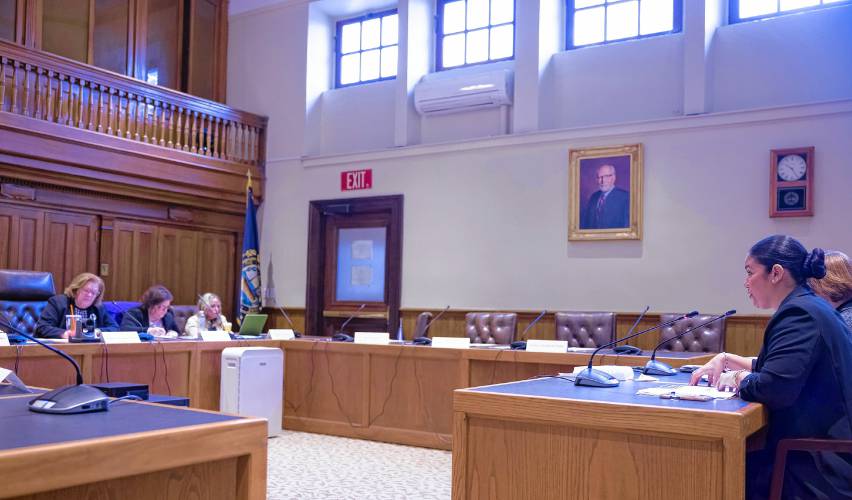Opinion: The Senate must preserve the Office of the Child Advocate

Cassandra Sanchez, New Hampshire's Child Advocate, presents at the Oversight Commission on Children's Services on March 21, 2025. House lawmakers voted to cut her office in the upcoming budget. GEOFF FORESTER
| Published: 04-30-2025 11:51 AM |
Moira O’Neill, PhD served as New Hampshire’s first Child Advocate from 2018 to 2022. She lives on the Coast of Maine.
The New Hampshire House of Representatives passed a budget last week that eliminates the Office of the Child Advocate (OCA). Next, the Senate contemplates the end of this unique and vital agency. A review of its genesis, mandate and accomplishments may assure the best decision.
Under RSA 21-V, the OCA is an independent agency mandated to ensure children involved in state systems “receive timely, safe and effective services and that their best interests are being protected.” Like most states with similar offices, tragic, preventable child deaths prompted the OCA’s establishment in legislation in 2017.
Perhaps the short two-year legislative term impedes long-term memory for the heartbreak of young lives lost, overwhelming news coverage, lawsuits and the hard work of reform. Recently deceased Senator David Boutin would remember. He endured a late-night call from a grieving grandmother about one child’s death in 2014. In response, he sponsored legislation amending the Child Protection Act addressing immediate child safety and establishing the Commission on Child Abuse Fatalities.
The Commission’s work centered on examining deaths by abuse. A lack of access to information about children and state actions or inactions was a significant obstacle. Yet the need for protecting the privacy of children and their families calls for a delicate balancing act. Thus, the concept of an independent Child Advocate germinated in early Commission discussions.
Representative Dan McGuire suggested the OCA’s function is “duplicative.” He reportedly described the Office with two functions: oversight of DCYF and weighing in on legislation. In fact, RSA 21-V enables the office with four essential responsibilities: 1). Review state-provided or arranged care and services for children; 2). Review and collaborate with agencies on program and policy development based on best practices; 3.) Regularly consult with and advise the governor, legislators, agencies and the public about the best interests of children and the state of the system; and 4). Provide outreach and education on child-serving systems, including disseminating research findings and standards of care that improve services.
Most unique is OCA’s endowed authority to access information and children themselves. State and federal laws govern strict confidentiality of children’s records, with good reason. Public exposure to details of family dysfunction, illness and other challenges contributing to child abuse, neglect or delinquency is traumatic. It can exacerbate interruptions of children’s developmental processes.
The OCA is situated to be the trusted eyes and ears of the public. Their access to children, information, and facilities in which they are placed provides a bird’s eye view no one else has. The statute also protects people who provide information to the OCA, including state agency personnel whose voices may be impeded by agency priorities or executive agenda. The result is information brought to the table representing only what is best for children. The OCA is the voice of children.
Article continues after...
Yesterday's Most Read Articles
Had the OCA existed when Senator Boutin received that grieving grandmother’s call, the Child Advocate could have investigated. The investigation would have examined the trajectory of the child’s case, including the context of agency actions: staffing, resources, regulatory demands and other factors that facilitate or restrict action. Case findings would then be paired with education about child needs, appropriate interventions and policy adjustments to facilitate best outcomes.
For example, the OCA’s very first investigation of a child’s death in 2018 revealed an overwhelmed dad whose child’s needs would have benefited from Voluntary Services. The legislature had eliminated those services in recession-era budget cuts. Access to that information and authority to educate legislators with it resulted in allocations to bring the services back and, eventually, new investments in a wide system of mental and behavioral health services for children. A late-night call made in grief can trigger action: the convening of formal inquiry and establishment of fresh oversight.
But without institutional commitment to systemic change, the calls will continue, too late. We must be committed to understanding and changing the complex set of factors imperiling children’s well-being. Eliminating the OCA reflects lack of commitment.
The good news is, the budget is now before the Senate, led by Senator Sharon Carson. A member of the Commission on Child Abuse Fatalities, Carson championed bills that established and strengthened the OCA. Hopefully, she remembers what it was like when even the Commission could not get to the bottom of tragedy without the OCA. Children, the legislature, the executive branch and the public rely upon the work of the OCA for safe, effective services.
The Senate must preserve the Office of the Child Advocate.







 Opinion: Trumpism in a dying democracy
Opinion: Trumpism in a dying democracy Opinion: What Coolidge’s century-old decision can teach us today
Opinion: What Coolidge’s century-old decision can teach us today Opinion: The art of diplomacy
Opinion: The art of diplomacy Opinion: After Roe: Three years of resistance, care and community
Opinion: After Roe: Three years of resistance, care and community
